

Projects. Syllabi. Datasets. GIS. Time Tracking. Tutorials and games. Tools. GitHub. Blogs. Articles. Reviving stalled or neglected DH projects. Choosing an Ontology Framework - Understanding Context. Ontology is a knowledge representation language like Roger Schank‘s Semantic Networks and John Sowa‘s Conceptual Graphs or Doug Lenat‘s Semantic Web.
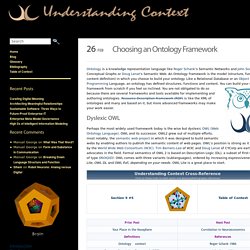
An Ontology framework is the model (structure, function and content definition) in which you choose to build your ontology. Like a Relational Database or an Object Oriented Programming Language, an ontology has defined structures, functions and content. You can build your own framework from scratch if you feel so inclined. You are not obligated to do so because there are several frameworks and tools available for implementing and authoring ontologies. Perhaps the most widely used framework today is the wise but dyslexic OWL (Web Ontology Language). Ontologies capture knowledge in context. Atlas of the Historical Geography of the United States. A spectacular historical atlas refashioned for the 21st century Here you will find one of the greatest historical atlases: Charles O.
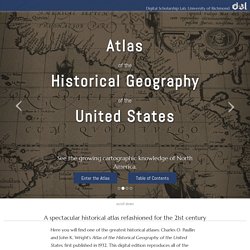
Paullin and John K. Wright's Atlas of the Historical Geography of the United States, first published in 1932. Timeline of History - Historiography.io. Bibliographic Ontology Specification. rOpenGov — Algorithms for Computational Social Science and Digital Humanities. The Plain Person’s Guide to Plain Text Social Science. JSTOR Labs. Data Citation. PastPin by Geopast. Digital humanities scholars receive Mellon support. Thomas Mullaney The Andrew W.
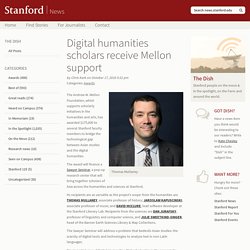
Mellon Foundation, which supports scholarly initiatives in the humanities and arts, has awarded $175,000 to several Stanford faculty members to bridge the technological gap between Asian studies and the digital humanities. The award will finance a Sawyer Seminar, a pop-up research center that will bring together scholars of Asia across the humanities and sciences at Stanford. Its recipients are as versatile as the project’s scope: from the humanities are THOMAS MULLANEY, associate professor of history; JAROSLAW KAPUSCINSKI, associate professor of music; and DAVID MCCLURE, lead software developer at the Stanford Literary Lab.
Recipients from the sciences are DAN JURAFSKY, professor of linguistics and computer science, and JULIE SWEETKIND-SINGER, head of the Banner Earth Sciences Library & Map Collections. The Sawyer Seminar will address a problem that bedevils Asian studies: the scarcity of digital tools and technologies to analyze text in non-Latin languages. Using games to understand government data collections. Around the world something interesting is happening: Governments, and even a few private companies, are opening up huge stores of data they've been collecting over decades.
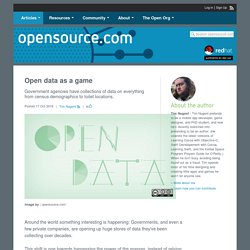
This shift is one towards harnessing the power of the masses, instead of relying on what an entity can achieve itself. For the first time, anyone with a computer and the Internet can access some of what their government produces and do something fantastic with it. There are two basic ways of making use of that data: make tools that offer up insight, or represent the data in some way which allows people to derive their own insights.
For the past four years at GovHack AU, the annual open government data hackathon held in Australia, civic hackers have been doing just that. GovHack AU includes over 2000 people who participate as a team or individual. A Companion to Digital Humanities. Exactly What Is OpenStack? Red Hat's Rich Bowen Explains. You've probably heard of OpenStack.
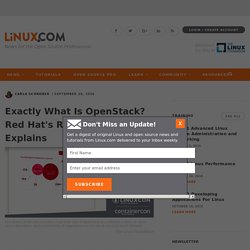
It's in the tech news a lot, and it's an important open source project. But what exactly is it, and what is it for? Rich Bowen of Red Hat provided a high-level view of OpenStack as a software project, an open source foundation, and a community of organizations in his talk at LinuxCon North America. OpenStack is a software stack that went from small to industry darling at warp speed. Welcome to behave! — behave 1.2.5 documentation. How to Uncover Corruption Using Open Source Research - bellingcat. When most people think about open source research, they think about uncovering social media materials of soldiers on the front-lines of the wars in Ukraine and Syria, or geolocating video footage of significant events with Google Earth.
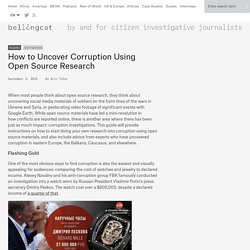
While open source materials have led a mini-revolution in how conflicts are reported online, there is another area where there has been just as much impact: corruption investigations. This guide will provide instructions on how to start doing your own research into corruption using open source materials, and also include advice from experts who have uncovered corruption in eastern Europe, the Balkans, Caucasus, and elsewhere. Rome Reborn. About the Programming Historian. Researchware - Qualitative Research Software for the Analysis of Qualitative Data. Computational Anthropology Reveals How the Most Important People in History Vary by Culture. Data mining Wikipedia people reveals some surprising differences in the way eastern and western cultures identify important figures in history, say computational anthropologists.
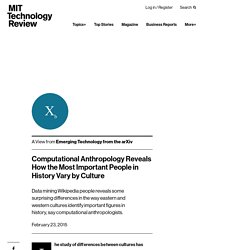
February 23, 2015 The study of differences between cultures has been revolutionized by the internet and the behavior of individuals online. Closed Access. ZfdG - Zeitschrift für digitale Geisteswissenschaften. Figshare - credit for all your research. Data First Manifesto. (Clio-online) Geschichte und Internet - Clio-online. Attic-labs/noms: The versioned, forkable, syncable database. Language… by Brenda H. Boerger et al. Finding Stories in… by Paul Bradshaw. One spreadsheet can tell many stories.
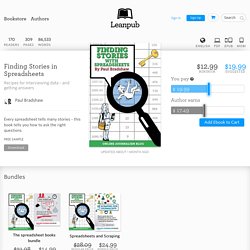
You just have to know the right questions to ask. Based on a decade of training journalists and working with news organisations on data-driven stories, Finding Stories In Spreadsheets outlines the techniques for asking the right questions of data using tools like Excel and Google spreadsheets. These aren't just questions about numbers: you'll find out how spreadsheet techniques can help you find the 'needle in the haystack' in text data. You'll learn how to clean up and modify your data so that you can ask it different questions, or get it ready for maps or charts, how to create new data from raw materials, and how to combine datasets to look for connections and trends.
With regular examples from journalism and real life data to work with, Finding Stories In Spreadsheets is *full* of those questions, in the language that spreadsheets understand. Cover image concept by @CarolineBeavon. Leanpub: Publish Early, Publish Often. Welcome. The Public Domain Review. EvoText: A new tool for analyzing the biological sciences. Open Access Abstract We introduce here evoText, a new tool for automated analysis of the literature in the biological sciences. evoText contains a database of hundreds of thousands of journal articles and an array of analysis tools for generating quantitative data on the nature and history of life science, especially ecology and evolutionary biology.
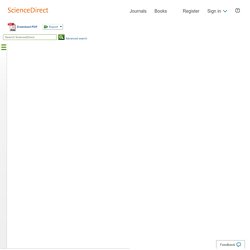
This article describes the features of evoText, presents a variety of examples of the kinds of analyses that evoText can run, and offers a brief tutorial describing how to use it. ArchBook: Architectures of the Book. ArchBook is an open-access, peer-reviewed collection of richly illustrated essays about specific design features in the history of the book.
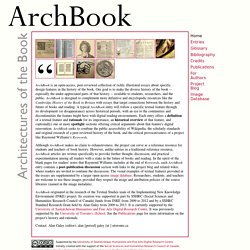
Our goal is to make the diverse history of the book -- especially the under-appreciated parts of that history -- available to students, researchers, and the public. ArchBook is designed to complement more definitive and encyclopedic resources like the Cambridge History of the Book in Britain with essays that target connections between the history and future of books and reading.
A typical ArchBook entry will follow a specific textual feature through its development (or disappearance) across historical periods, with an eye to the continuities and discontinuities the feature might have with digital reading environments. Although ArchBook makes no claim to exhaustiveness, the project can serve as a reference resource for students and teachers of book history. Source Clips. Marathon County Pommersch Female speaker, born 1903, Hamburg, Marathon County, WI. Date/Place of Interview: June 18, 1968, Marathon County, WI. Thngs — a place for every thing. Digital Humanities Israel. View all projects.